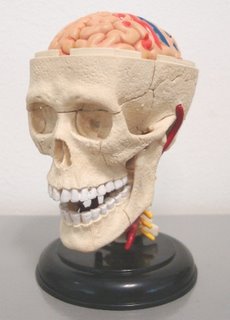 Which one of these is a real image?
Which one of these is a real image?1. A photograph of you
2. Your reflection in a mirror
You are thinking: "HAH! That's simple secondary school physics. The photo is a REAL image. The reflection is a VIRTUAL image. Who doesn't know that?"
Yes, you're right.
But which image feels more real?
 I mean, just look into a mirror.
I mean, just look into a mirror.It's YOU right there!
She moves! She breathes!
The "person in the mirror" feels so real that it is a common theme in numerous fantasy and horror stories.
Never mind the fact that it is merely a virtual image, a transient stream of photons that disappears the moment you walk away from the mirror. You can't hold it in your hand or keep it in your pocket.
What about a photograph then?
Well, a photo does have more permanence. It is printed on a physical medium, and you can store it for years.
So you can laugh at your nerdy fashion sense or cry at your loss of youthful beauty ten years down the road.
But even the highest resolution, most artfully taken photograph is still flat and lifeless compared to your image in a mirror.
It's a real image, but it doesn't feel as real as a virtual image.
Why?
And more importantly, why should ANYONE care???
Heh, I'll give you the straight goods.
$$$$

Fact: The MMOG (Massively Multiplayer Online Game) global market size has hit US$1 billion in 2006. Role-playing games such as World of Warcraft and virtual worlds such as Second Life are so popular that the market is projected to reach US$1.5 billion by 2011. Second Life may be a virtual world, but it has a real economy: nearly US$1.6 million dollars are traded daily within the game.
Fact: Actors who play doctors on TV earn more money than real doctors. Noah Wyle, who played Dr. John Carter on the TV show ER, earned an estimated US$9 million in 2004 - a staggering 45 times more than the average salary of actual ER doctors. As for actors who play doctors in the movies... let's not even go there.
Fact: "Alternative" medical practitioners can also make more money than real doctors. The US market for complementary and alternative medicine reached US$5 billion in 2005 and continues to grow. CDC reports that a whopping 74.6% of Americans used alternative medicine in 2005. Hugely popular products and services - which have little or no therapeutic effect when tested scientifically.
Fact: Motivational speakers and trainers make a tonne of money. In 2006, the total US market for "self-improvement" products and services climbed to US$9.6 billion. One example is the popular motivational speaker Deepak Chopra who often passes off diffuse and mangled nonsense as deep wisdom.
And...
Fact: The biggest personal fortune ever made in human history was built on the foundations of a "virtual" concept - software licensing. Bill Gates didn't make his billions of dollars building computers. He didn't even write the original code for the first MS-DOS. But yet he took only 30 years to amass a personal wealth of US$56 billion. In comparison it took Coca Cola more than one hundred years to reach a total worth of US$58 billion.
Now - do you see the importance of examining our peculiar human tendency to regard virtual things as more real than real?
Some kind of "Real Virtuality", if you will.
It makes cents, of course.
But it also makes sense.
Stay tuned for Part II (It's all Plato's fault!) ...






2 Comments:
Nice post, and good points. I didn't know that complementary medicine was that big in the US. What is it like in Singapore, do people rely on alternative methods to a large extent?
Thanks!
In Singapore, mainstream medicine is used by many people, but traditional Chinese medicine (TCM) is still very popular. In fact one of our local university has a biomedical science & TCM double-degree program.
Which is bizarre because there is no first principle commonality between modern science and TCM. I don't know how conflicted or confused these graduates will feel.
*shrug*
Post a Comment